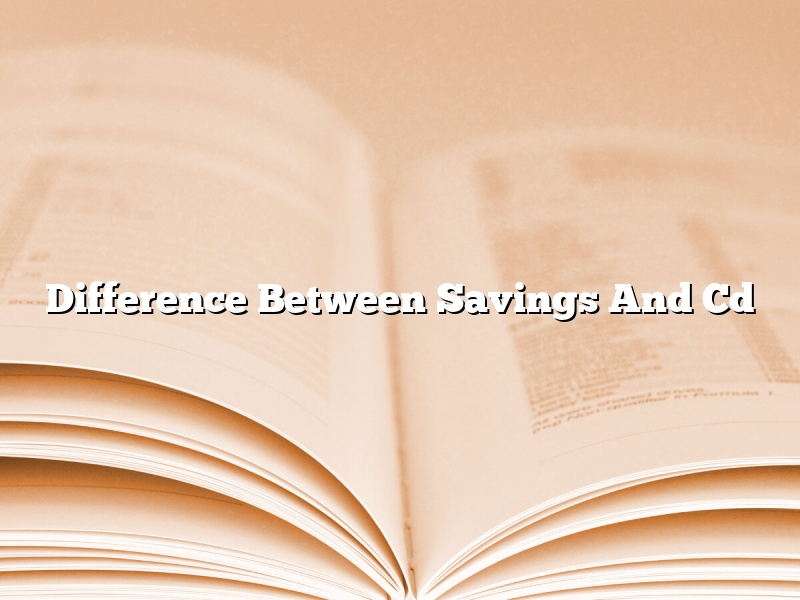When it comes to saving money, there are a few different options to choose from. One option is a savings account, which is a type of bank account that pays interest on the deposited money. Another option is a certificate of deposit (CD), which is a type of savings account that offers a higher interest rate but comes with a longer holding period. Here’s a look at the key differences between savings accounts and CDs:
Interest Rates: The interest rate on a savings account is typically lower than the interest rate on a CD. This is because the money in a savings account is more accessible than the money in a CD, so the bank can offer a lower interest rate and still make a profit.
Access to Funds: With a savings account, you can access your funds at any time. This is not the case with a CD, which has a holding period of typically six months or longer. This means you can’t withdraw your money from a CD until the holding period is over.
Fees: Some banks charge fees for opening and maintaining a savings account, but there are no fees associated with a CD.
Length of Holding Period: The length of the holding period is another key difference between savings accounts and CDs. With a savings account, you can typically withdraw your money at any time. With a CD, you have to wait until the holding period is over to withdraw your money.
When it comes to saving money, a CD can be a good option if you’re looking for a higher interest rate. However, keep in mind that you won’t be able to access your funds until the holding period is over. If you need access to your money before the holding period is over, a savings account may be a better option.
Contents [hide]
Is it better to put your money in a CD or a savings account?
Is it better to put your money in a CD or a savings account?
When it comes to saving money, there are a variety of options to choose from. Two of the most common are certificates of deposit (CDs) and savings accounts. So, which one is better?
The answer to this question depends on a few factors, such as how long you plan to save your money and what kind of return you’re looking for.
Certificates of deposit are a type of savings account that offer a fixed interest rate for a set period of time. This can be anywhere from a few months to a few years. CDs are a good option if you want a guaranteed return on your investment.
Savings accounts, on the other hand, offer a much lower interest rate than CDs. However, they are more liquid, which means you can access your money more easily. This can be important if you need to use your money for a specific purpose.
In the end, it’s important to consider your specific needs when deciding whether to put your money in a CD or a savings account.
Why might I use a savings account instead of a CD?
When it comes to saving money, there are a variety of different account options to choose from. One popular option is the certificate of deposit, or CD. However, another option that you might want to consider is a savings account. Here are a few reasons why you might want to use a savings account instead of a CD:
1. You Can Access Your Money Easier
With a CD, you have to wait until the term of the CD is up in order to access your money. However, with a savings account, you can access your money at any time, without penalty. This can be especially helpful if you need access to your money in a hurry.
2. Your Money Earns More Interest
CDs usually offer a lower interest rate than savings accounts. This means that your money will grow more slowly in a CD than in a savings account.
3. You Can Use Your Savings Account to Pay Bills
If you need to make a payment but don’t have enough money in your checking account, you can use your savings account to pay the bill. This can be a helpful way to avoid overdraft fees.
4. You Can Use Your Savings Account to Build Your Credit
If you have a savings account that you use regularly, this can help boost your credit score. This is because banks like to see that you have a history of using credit responsibly.
5. You Can Use Your Savings Account to Cover Emergencies
If you ever need to access money quickly, your savings account can be a helpful resource. This is because you can typically access your money within a day or two, compared to the weeks it can take to access money from a CD.
So, if you’re considering opening a savings account, these are some of the reasons why you might want to do so. Keep in mind that a savings account is not right for everyone, so be sure to weigh the pros and cons before making a decision.
Can you lose money in a CD?
Can you lose money in a CD?
In a word, yes.
Certificates of Deposit, or CDs, are one of the more popular investment vehicles available. They offer a relatively safe place to park your money, and the potential for higher returns than you might get from a traditional savings account. However, there is always the possibility that you could lose money on a CD.
The reason you could lose money on a CD has to do with the way they are structured. A CD is a loan to the bank, and you agree to let the bank use your money for a certain period of time in exchange for a set return. If the bank goes bankrupt, or if interest rates drop significantly, you could lose money on your CD.
So, can you lose money in a CD? Yes, it is possible. However, if you choose a reputable bank and invest for a reasonable amount of time, the chances of losing money are relatively low.
Is a CD considered a savings account?
A CD, or certificate of deposit, is a savings account that typically offers a higher interest rate than a traditional savings account. In order to open a CD, you must typically deposit a minimum amount of money, which is typically $500 or more.
A CD is not considered a checking account, and you cannot write checks from a CD account. You can, however, withdraw money from a CD account at any time, although you will typically incur a penalty if you do so before the CD’s maturity date.
A CD is a great option for people who want to save money and earn a higher interest rate than they would receive from a traditional savings account.
How much will a CD earn in 5 years?
A CD, or certificate of deposit, is a type of savings account that offers a fixed interest rate and a predetermined maturity date. savers can typically earn more interest with a CD than they would with a standard savings account.
How much a CD will earn in 5 years depends on a number of factors, including the interest rate offered and the length of the CD. Generally, the longer the CD, the higher the interest rate.
As of September 2017, the average interest rate on a 1-year CD was 0.84%, while the average interest rate on a 5-year CD was 2.14%. This means that a saver who invested in a 1-year CD would earn about $8.40 in interest, while a saver who invested in a 5-year CD would earn about $21.40 in interest.
However, it’s important to note that interest rates can change over time, so it’s important to shop around and compare rates before investing in a CD.
What are the disadvantages of a CD?
A CD, or compact disc, is a digital storage medium that is used to store music, videos, and other data. While CDs offer many advantages, they also have a few disadvantages.
One disadvantage of CDs is that they are not as durable as other storage media. CDs can be scratched or damaged, which can cause data loss or corruption.
Another disadvantage of CDs is that they can only be played on devices that have a CD player. This means that CDs cannot be played on devices like smartphones or tablets.
Finally, CDs are not as storage-efficient as other storage media. This means that CDs can hold less data than other storage media.
Are CDs a good investment in 2022?
Are CDs a good investment in 2022?
This question is difficult to answer definitively, as the answer depends on a number of factors, including interest rates, the overall economy, and the specific CD. However, in general, CDs can be a good investment, as they offer a relatively safe and stable return on investment.
One thing to keep in mind is that interest rates may be lower in 2022 than they are today, so a CD may not offer as much return as it would if interest rates were higher. Additionally, the overall economy may not be as strong in 2022 as it is today, which could also affect the value of a CD.
That said, if you are looking for a relatively safe and stable investment, a CD may be a good option for you. Just be sure to shop around and compare rates before you invest, as rates can vary significantly from one institution to the next.




